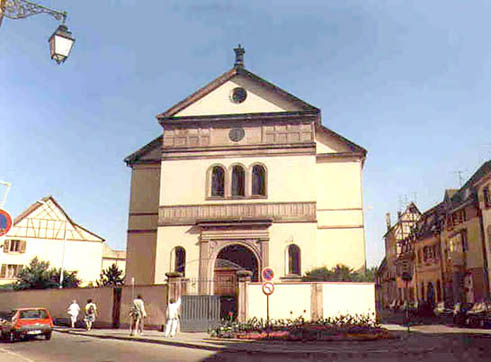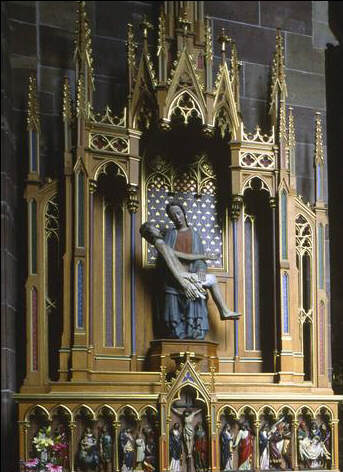 Michael Shurkin
Michael ShurkinI returned to that part of the world in the summer of 2001. I had just spent a year living, more or less as an observant Jew, in Baltimore's suburban Jewish ghetto. Pikesville, Maryland, is a place entirely devoid of beauty and filled with a culture wholly hostile to Romanticism of any sort. It is the anti-Alsace. Heine, if he had ever had the misfortune of having to spend any time in Pikesville, would have shot himself. I would have, too, if the German government had not saved my life by granting me an escape, a scholarship to spend eight weeks in Freiburg, just across the Rhine from Colmar. My summer there was heaven. My classmates were from all over the world; I met a woman, a sturdy Bavarian graduate student; and I savored all the earthly delights offered by a prosperous German university town nestled in the Black Forest: skinny dipping in mountain lakes, browsing through book stores, hanging out in student pubs, and drinking glass after glass of golden beer. Yet every Friday I took the bus across the river to Colmar to spend shabbat with the family that I had befriended there. In just three-quarters of an hour, that magic bus -- actually, Südbadenbus 1076 -- took me from one pole of my existence to another. In Freiburg I was the universalist and free-spirit; in Colmar, the conscientious Jew. In Freiburg there was the Bavarian girl, with whom I went mountain climbing in the Alps and once crossed the Rhine in Basle on a wooden skiff at dusk. In Colmar, the Grand Rabbi's wife lectured me about the importance of finding a nice Jewish girl.
 And so, this January, when I returned for a short visit, I spent shabbat in Colmar with the same family that has fed me time after time, a family that would likewise nourish me with their sense of tradition and their familial bliss. And again I went to Strasbourg, this time with the Bavarian girl. We went to the Cathedral, and she sat and contemplated the altar while I wandered around and bought a brochure. I then sat in the chair behind her in a bid to see the altar as she saw it. It was impossible. The Cathedral belonged to her, a German Catholic, in a way that it could never belong to me. Even if I chose it, even if I followed Heine, I would still be at best a welcome guest - just as I was with the family in Colmar, whose world is also not my own. The beauty of the Cathedral still moved me, but I felt a keen sense of just passing through. I wanted to go home.
And so, this January, when I returned for a short visit, I spent shabbat in Colmar with the same family that has fed me time after time, a family that would likewise nourish me with their sense of tradition and their familial bliss. And again I went to Strasbourg, this time with the Bavarian girl. We went to the Cathedral, and she sat and contemplated the altar while I wandered around and bought a brochure. I then sat in the chair behind her in a bid to see the altar as she saw it. It was impossible. The Cathedral belonged to her, a German Catholic, in a way that it could never belong to me. Even if I chose it, even if I followed Heine, I would still be at best a welcome guest - just as I was with the family in Colmar, whose world is also not my own. The beauty of the Cathedral still moved me, but I felt a keen sense of just passing through. I wanted to go home.
On the bus that shuttles back and forth across the Rhine from Colmar to Freiburg, I discovered an interesting paradox about Alsatians. Listening in on their conversations, I was always impressed by, and jealous of, their apparent borderlessness. The Rhine meant nothing to them, for on either bank they maintained the same bizarre polyglot banter in which French, German, Alsatian, and Badisch were all entirely interchangeable. They literally switched languages from word to word, sentence to sentence. Sometimes I addressed them in French, sometimes in German. I don't know if they noticed one way or the other, and I can never recall in which language they had spoken to me. There are simply no boundaries on Südbadenbus 1076. How gloriously universalist, I thought.
But then I realized that the Alsatians' linguistic univeralism was in fact a marker of their particularism. By being both German and French they are neither German nor French. They are Alsatians, and out of a clash of identities they have derived their own, unique identity, which resolves the tensions between the two cultures while negating neither. Although Alsatians are touchy about how French or Germans perceive them, it is only because the French and the Germans occasionally question their loyalty. The Alsatians themselves are remarkably comfortable with their own cultural dualism and recognize in it their own distinctiveness. They do not fret about alienation.
Jews like me who know the discomfort of living à cheval between two
worlds, which each leg stuck on either side of the apparently
uncloseable chasm between
Judaism and the universal, can learn to embrace the posture, however uncomfortable it sometimes is. One key is simply to stop "dancing on the needle point of why," in favor of simply living. Particularly given the fact that we live in a society that is free of the kind of anti-Semitism that Weill or Heine constantly faced, there is no reason why we have to justify to ourselves or to anyone else our attachment to a particularist identity. This is America's gift. Another key, taken from the Alsatian example, is to recognize the duality of our identities as the essence of our identity, the marker of our specificity as modern Western Jews. We can locate authenticity in our searching, that is, in our attempt to negotiate between both sides. To renounce either would be self-deception; to abstain from earnestly engaging with both, or simply to accept either without questioning, would be bad faith. This is what Weill did: after several years of struggling, he finally made it to Paris, where he found a job, married, and settled into whatever contradictions he settled into.
The national mall's barricades as installation art
January, 2003
Why modern art survives in a postmodern age
October, 2002
The Art of the Press Conference
September, 2002
What is modernism?
July, 2002
What draws protesters to shout about banal holocaust art?
April, 2002
Am I an environmentalist for the same reasons I don't like to spend money?
April, 2002



strasbourg
cathedral
Michael Shurkin
the other rally
Sam Brody
what the world is &
what to do about it
Jay Michaelson
Treasure
Ron Mohring
sha'atnez
Abraham Mezrich
what is charlie kaufman doing?
Dan Friedman
josh visits the
holocaust museum
Josh Ring
saddies
David Stromberg
about zeek
archive
